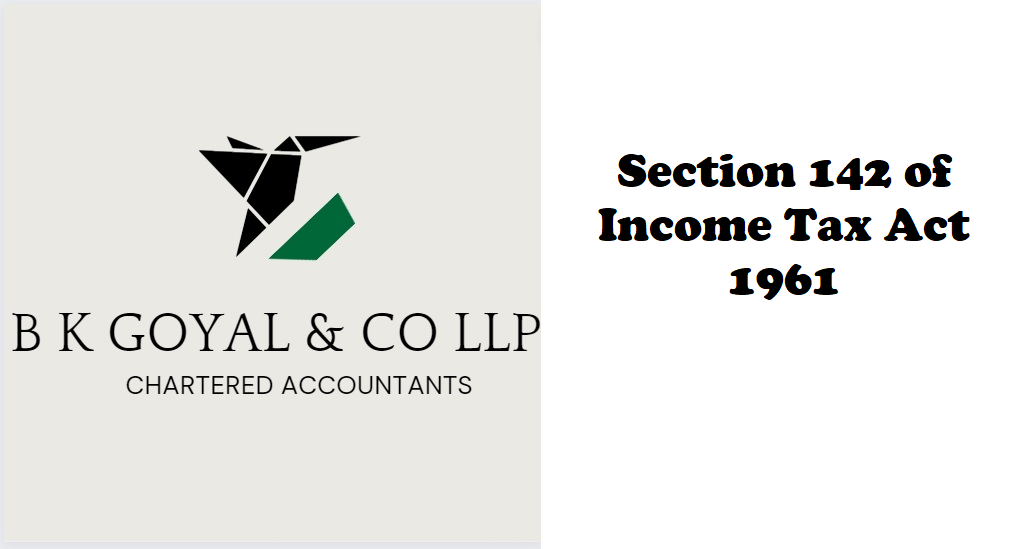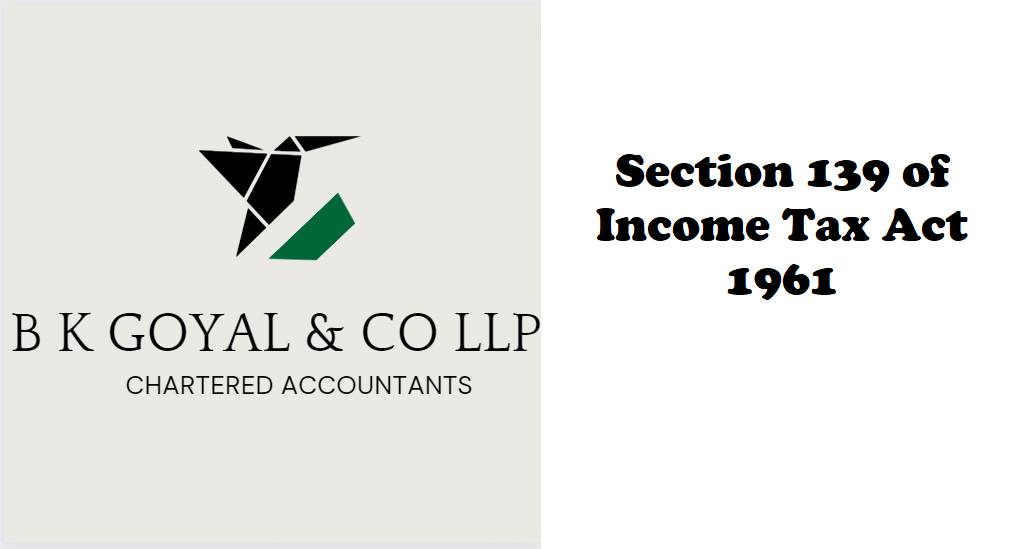Section 142 of Income Tax Act 1961
Inquiry before assessment (1) For the purpose of making an assessment under this Act, the Assessing Officer may serve on any person who has made a return under section 115WD or section 139 or in whose case the time allowed under sub-section (1) of section 139 for furnishing the return has expired a notice requiring him, on a date to be therein specified,— (i) where such person has not made a return within the time allowed under sub-section (1) of section 139 or before the end of the relevant assessment year, to furnish a return of his income or the income of any other person in respect of which he is assessable under this Act, in the prescribed form and verified in the prescribed manner86 and setting forth such other particulars as may be prescribed, or* : Provided that where any notice has been served under this sub-section for the purposes of this clause after the end of the relevant assessment year commencing on or after the 1st day of April, 1990 to a person who has not made a return within the time allowed under sub-section (1) of section 139 or before the end of the relevant assessment year, any such notice issued to him shall be deemed to have been served in accordance with the provisions of this sub-section: 87[Provided further that a notice under this sub-section for the purposes of this clause may also be served by the prescribed88 income-tax authority, †] (ii) to produce, or cause to be produced, such accounts or documents as the Assessing Officer may require, or (iii) 89to furnish in writing and verified in the prescribed manner information in such form and on such points or matters (including a statement of all assets and liabilities of the assessee, whether included in the accounts or not) as the Assessing Officer may require : Provided that— (a) the previous approval of the Joint Commissioner shall be obtained before requiring the assessee to furnish a statement of all assets and liabilities not included in the accounts; (b) the Assessing Officer shall not require the production of any accounts relating to a period more than three years prior to the previous year. (2) For the purpose of obtaining full information in respect of the income or loss of any person, the Assessing Officer may make such inquiry as he considers necessary. 90[(2A) If, at any stage of the proceedings before him, the Assessing Officer, having regard to the nature and complexity of the accounts, volume of the accounts, doubts about the correctness of the accounts, multiplicity of transactions in the accounts or specialised nature of business activity of the assessee, and the interests of the revenue, is of the opinion that it is necessary so to do, he may, with the previous approval of the Principal Chief Commissioner or Chief Commissioner or Principal Commissioner or Commissioner, direct the assessee to get either or both of the following, namely:— (i) to get the accounts audited by an accountant, as defined in the Explanation below sub-section (2) of section 288, nominated by the Principal Chief Commissioner or Chief Commissioner or Principal Commissioner or Commissioner in this behalf and to furnish a report of such audit in the prescribed form duly signed and verified by such accountant and setting forth such particulars, as may be prescribed91, and such other particulars as the Assessing Officer may require; (ii) to get the inventory valued by a cost accountant, nominated by the Principal Chief Commissioner or Chief Commissioner or Principal Commissioner or Commissioner in this behalf and to furnish a report of such inventory valuation in the prescribed form91 duly signed and verified by such cost accountant and setting forth such particulars, as may be prescribed, and such other particulars as the Assessing Officer may require: Provided that the Assessing Officer shall not direct the assessee to get the accounts so audited or inventory so valued unless the assessee has been given a reasonable opportunity of being heard.] (2B) The provisions of sub-section (2A) shall have effect notwithstanding that the accounts of the assessee have been audited under any other law for the time being in force or otherwise. (2C) Every report under sub-section (2A) shall be furnished by the assessee to the Assessing Officer within such period as may be specified by the Assessing Officer : Provided that the Assessing Officer may, suo motu, or on an application made in this behalf by the assessee and for any good and sufficient reason, extend the said period by such further period or periods as he thinks fit; so, however, that the aggregate of the period originally fixed and the period or periods so extended shall not, in any case, exceed one hundred and eighty days from the date on which the direction under sub-section (2A) is received by the assessee. (2D) The expenses of, and incidental to, any 92[audit or inventory valuation under sub-section (2A) (including the remuneration of the accountant or the cost accountant, as the case may be)] shall be determined by the Principal Chief Commissioner or Chief Commissioner or Principal Commissioner or Commissioner (which determination shall be final) and paid by the assessee and in default of such payment, shall be recoverable from the assessee in the manner provided in Chapter XVII-D for the recovery of arrears of tax : Provided that where any direction for audit 93[or inventory valuation] under sub-section (2A) is issued by the Assessing Officer on or after the 1st day of June, 2007, the expenses of, and incidental to, 94[such audit or inventory valuation (including the remuneration of the accountant or the cost accountant, as the case may be)] shall be determined by the Principal Chief Commissioner or Chief Commissioner or Principal Commissioner or Commissioner in accordance with such guidelines as may be prescribed95 and the expenses so determined shall be paid by the Central Government. (3) The assessee shall, except where the assessment is made under section 144, be given an opportunity of being heard in respect of any material gathered on the basis of any inquiry under sub-section (2) or any audit 96[or inventory valuation] under sub-section (2A) and proposed to be utilised for the purposes of the assessment. (4) The
Section 142 of Income Tax Act 1961 Read More »









